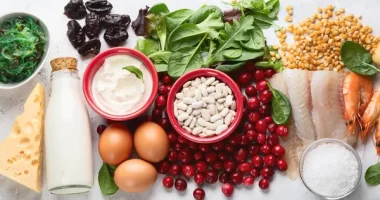What Are The Warning Signs Of Stomach Cancer?. Stomach cancer, which is also called gastric cancer, is a growth of cells that starts in the stomach. The stomach is in the upper middle part of the belly, just below the ribs. The stomach helps to break down and digest food.
Stomach cancer is common worldwide and according to the American Cancer Society, “The estimates for stomach cancer (also known as gastric cancer) in the United States for 2022 are:
–About 26,380 new cases of stomach cancer (15,900 in men and 10,480 in women)
–About 11,090 deaths from this type of cancer (6,690 men and 4,400 women)
Stomach cancer accounts for about 1.5% of all new cancers diagnosed in the US each year.” Eat This, Not That! Health spoke with cancer specialists who have not treated Keith and explained what to know about stomach cancer and signs that indicate you have it.
1. What to Know About Stomach Cancer

Nita Ahuja, MD, chair of Surgery at Yale School of Medicine and a member of the scientific advisory council for No Stomach for Cancer that promotes awareness and research tells us, “Stomach cancer incidence has declined in the United States but is one of the most common cancers worldwide. The most common cancer in the stomach is an adenocarcinoma causing more than 90% of the cancers in the stomach. Other less common cancers are gastrointestinal stromal tumors, neuroendocrine cancers and even lymphomas.”
Alexander Bershadskiy, MD Interim Medical Director for the Division of Hematology/Oncology at Staten Island University Hospital says, “Unfortunately, most patients already have advanced disease at presentation, therefore paying attention to early symptoms is of utmost importance. Early detection increases the chances of cure.”
The Mayo Clinic says, “Stomach cancer, which is also called gastric cancer, is a growth of cells that starts in the stomach. The stomach is in the upper middle part of the belly, just below the ribs. The stomach helps to break down and digest food. Stomach cancer can happen in any part of the stomach. In most of the world, stomach cancers happen in the main part of the stomach. This part is called the stomach body. In the United States, stomach cancer is more likely to start by the gastroesophageal junction. This is the part where the long tube that carries food you swallow meets the stomach. The tube that carries food to the stomach is called the esophagus.”
2. Stomach Cancer is Treatable When Caught Early

Dr. Ahuja explains, “Stomach cancers are most treatable when they are in the early stages when the cancer is limited to the stomach only and has not spread to other organs nearby or far away. Newer advances in treatment of some adenocarcinomas include use of immunotherapy, and getting treatment at centers that are specialized in gastric cancers is key.”
Dr. Bershadskiy explains, “In general, when stomach cancer is confined only to the stomach and the fewer layers of the stomach the tumor invades, there is a higher chance of cure. In this scenario, the cancer is less likely to spread to distant parts of the body, such as lymph nodes, liver, lungs or the abdominal cavity allowing for a successful surgical procedure.”
According to the Mayo Clinic, “Stomach cancer treatment is most likely to be successful if the cancer is only in the stomach. The prognosis for people with small stomach cancers is quite good. Many can expect to be cured. Most stomach cancers are found when the disease is advanced and a cure is less likely. Stomach cancer that grows through the stomach wall or spreads to other parts of the body is harder to cure.”
3. Risk Factors for Stomach Cancer

Dr. Ahuja says, “For adenocarcinomas, certain populations are at higher risk including those with certain inherited predisposition as well as those who have experienced a long-term Helicobacter pylori infection. The majority of patients have no known risk factors. Most patients present with non-specific symptoms such as anemia, nausea or loss of appetite. Unexplained weight loss and difficulty swallowing or vomiting blood are often symptoms of advanced cancers. All of these should be worked up by a trained medical professional. Gastric cancers should be treated by high-volume teams and include multidisciplinary management.”
According to Dr. Bershadskiy, “Some risk factors for stomach cancer include H. Pylori infection, patients with high salt and various traditional intake of salt via preserved foods such as salted fish, cured meat, and salted vegetables, Nitroso compounds (from diet, tobacco smoke and other environmental sources), excess body weight, smoking, Epstein-Barr Virus infection, familial predisposition (family history), patients with gastric polyps and patients with pernicious anemia are some examples of risk factors for gastric cancer. These risk factors increase the risk for stomach cancer in various ways including but not limiting to increased inflammation in the stomach.”
4. Signs to Never Ignore

Dr. Bershadskiy explains, “Some of the signs and symptoms are weight loss and persistent abdominal pain, which are the most common symptoms at initial diagnosis. Other symptoms include nausea, difficulty with swallowing (dysphagia), black stools which signify bleeding (melena), early satiety, Ulcer type pain. You should see or call your doctor if you have any of the above symptoms.”
Yale Medicine says the following signs are symptoms of stomach cancer.
“Poor appetite
Unexplained weight loss
Abdominal pain
Vague discomfort in the abdomen, usually above the navel
Feeling full after a small meal
Heartburn or indigestion
Nausea
Vomiting, with or without blood
Swelling or fluid build-up in the abdomen
Blood in the stool
Feeling tired or weak, especially as a result of anemia
Yellowing of the skin and eyes if stomach cancer spreads to the liver.”
5. Reducing Salty Foods and Eating More Veggies Can Lower the Risk

Dr. Bershadskiy says, “Some but not all studies from Europe, Asia and North America have found intake of fruits and vegetables to be protective, fruits likely have a higher benefit. Reducing the risk of stomach cancer by 30-40%. The protective benefits of fruits and vegetables are likely related to their vitamin C content, which is thought to reduce the formation of carcinogenic N-nitro compounds inside the stomach.
Since salty foods have been linked to gastric cancer, reducing salt intake also leads to decreased risk of gastric cancer. Part of the decrease in incidence of gastric cancer worldwide in the last 50 years has partially been attributed to the spread of refrigeration since refrigeration allows food to be stored without the use of salt or salt-based preservation techniques.”
ALSO CHECK: Josko Gvardiol Face Mask: Why Is The Footballer Wearing A Face Mask?








